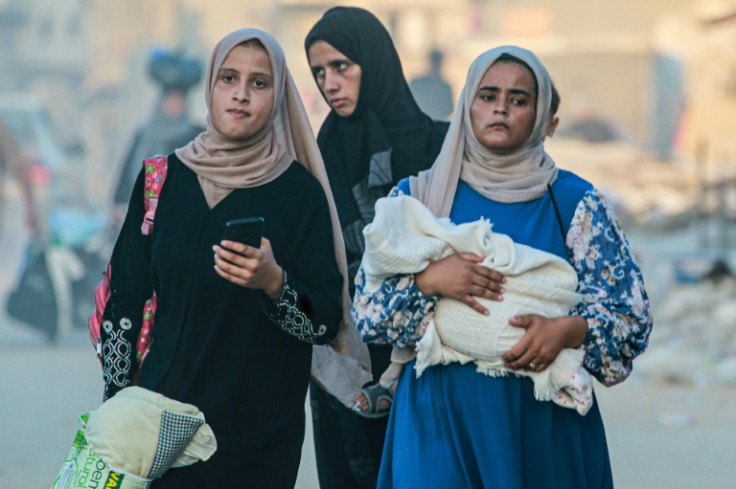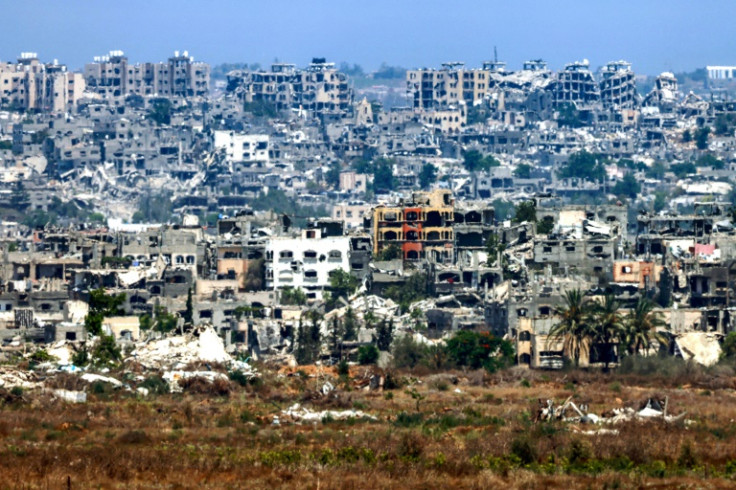
Tens of thousands of Palestinians have fled southern Gaza since Israel issued an evacuation order, amid fears of a new offensive in the area which came under Israeli bombardment on Wednesday.
On Israel's northern front, Lebanon's Hezbollah said it fired 100 rockets at Israeli targets in retaliation for a strike that killed a senior commander, heightening fears of full-scale war between the longtime foes.
Palestinian militant group Hamas said it had sent new "ideas" to Qatari mediators on ending the nearly nine-month conflict with Israel, which confirmed it was "evaluating" Hamas's statement on a deal to free its hostages.
Prime Minister Benjamin Netanyahu had earlier reiterated that Israel would only end its war with Hamas in the Gaza Strip once its objectives were achieved.
His military chief, Herzi Halevi, said Israel was engaged in "a long campaign" to destroy Hamas over the October 7 attack and to bring home the hostages held by Palestinian militants.
The United Nations said war had "unleashed a maelstrom of human misery" and that the latest evacuation order had plunged yet more Palestinians into "an abyss of suffering".
Ten days after Netanyahu said the war's "intense phase" was winding down, the Israeli military again rained down air strikes and artillery fire on militants in the Shujaiya district.
The air force struck "over 50 terror infrastructure sites" across Gaza in 24 hours while ground troops "eliminated terrorists", located tunnels and found weapons including AK-47 assault rifles, the military said.
Thousands have fled the fighting in Shujaiya, among them Umm Bashar al-Jamal, 42, who was now sheltering in Gaza City's Yarmuk sports stadium.
"We were displaced five days ago," she said. "We fled from Shujaiya. We woke up to the sound of tanks. The houses were bulldozed. All our homes!"
The Israeli army -- which issued an evacuation order for Shujaiya a week ago -- on Monday did the same for a larger area near Khan Yunis and Rafah in the south, raising fears of renewed heavy battles there.
Tens of thousands of Palestinians have again taken to the road, many bundling their scant belongings on top of cars or donkey carts as they sought safety elsewhere in the bombed-out wasteland.
The UN agency supporting Palestinian refugees, UNRWA, said 250,000 people had been affected by the latest evacuation order that covers southern areas bordering Israel and Egypt.
Almost all patients in the European Gaza Hospital and the Red Cross field hospital decided to flee following the evacuation order, the World Health Organization said.
Though the European Gaza Hospital itself is not under evacuation instructions, the order has impacted operations.
"Now only three patients remain at the European Gaza Hospital and three at the ICRC field hospital," the WHO said, citing figures from Tuesday.
UN chief Antonio Guterres's spokesman said the southern evacuation order covers 117 square kilometres (45 square miles), "making it the largest such order since October".
"Frankly, it's a step in the wrong direction. The direction we want to be heading is to find a negotiated two states solution," said the spokesman, Stephane Dujarric.
Andrea De Domenico, who heads the United Nations humanitarian office, OCHA, in the occupied Palestinian territories, said nine out of 10 people in Gaza had been displaced at least once by the war.
"Behind these numbers, there are people... that have fears and grievances. And they had probably dreams and hopes; the less and less I fear today, unfortunately," he told journalists.
"People who in the last nine months have been moved around like pawns in a board game."
Amid the war, siege and mass displacement, more than 150,000 people have contracted skin diseases in the squalid conditions, the World Health Organization said.
Wafaa Elwan, a Palestinian mother of seven who now lives in a tent city, said: "We sleep on the ground, on sand where worms come out underneath us."
She said her five-year-old son, much of whose body was covered in rashes and welts, "can't sleep through the night because he can't stop scratching his body".
The Gaza war broke out after Hamas's October 7 attack on southern Israel resulted in the deaths of 1,195 people, mostly civilians, according to an AFP tally based on Israeli figures.
The militants also seized 251 hostages, 116 of whom remain in Gaza including 42 the army says are dead.
Israel's retaliatory offensive has killed at least 37,953 people, also mostly civilians, according to figures from the Hamas-run territory's health ministry.
The Israeli military said Wednesday that "operational activities continue throughout the Gaza Strip".
The Gaza civil defence agency said seven people were killed when a strike hit a family house north of Gaza City.
Another strike killed three people in a car at Al-Maghazi refugee camp in the central Deir al-Balah area, an AFP reporter said.
The New York Times has quoted Israeli security officials as saying top generals see a truce as the best way to secure the release of the remaining hostages, even if that meant not achieving all the war goals.
Netanyahu strongly rejected this and vowed Israel would not give in to the "winds of defeatism".
"The war will end once Israel achieves all of its objectives, including the destruction of Hamas and the release of all of our hostages," he said.
On the Israeli-Lebanese border, violence escalated between Hezbollah and Israeli forces.
The Israeli military confirmed it killed a Hezbollah commander and, in response, Hezbollah said it fired "100 Katyusha rockets" at Israeli positions in the annexed Golan Heights.
The Iran-backed militant group also claimed other retaliatory strikes on two bases in northern Israel.









